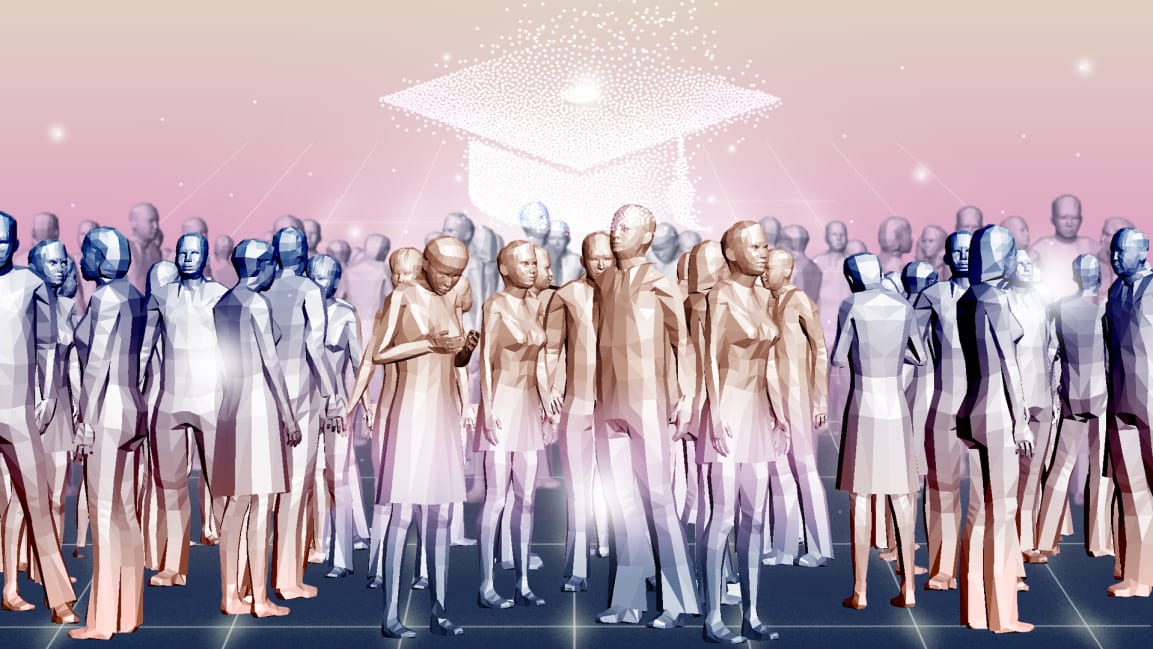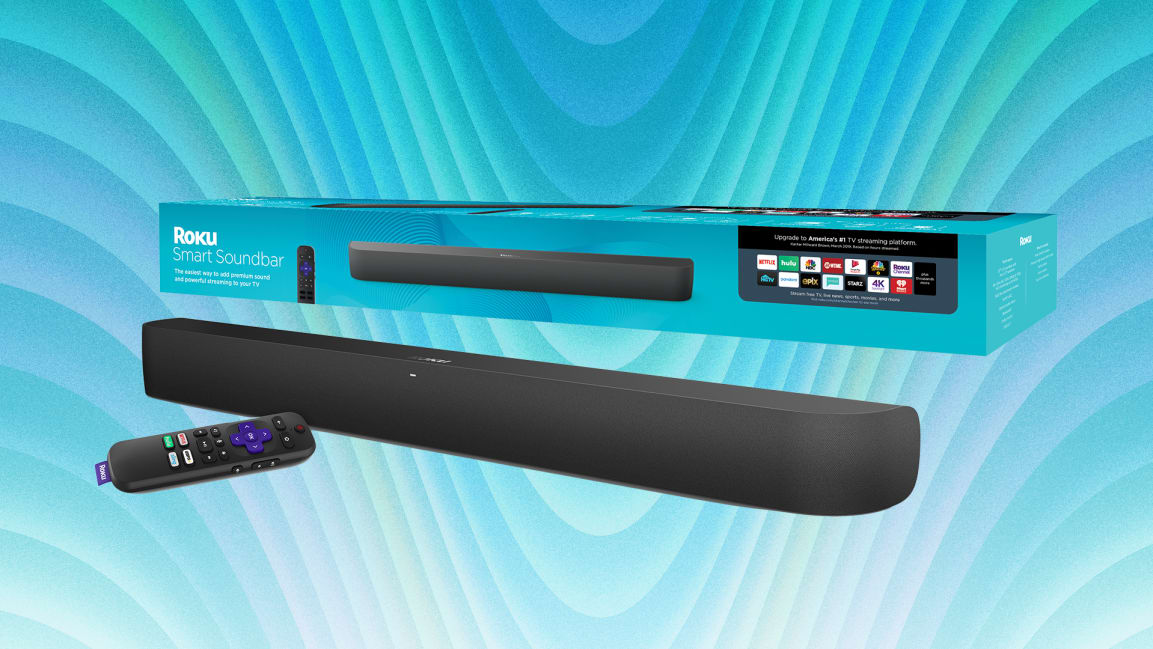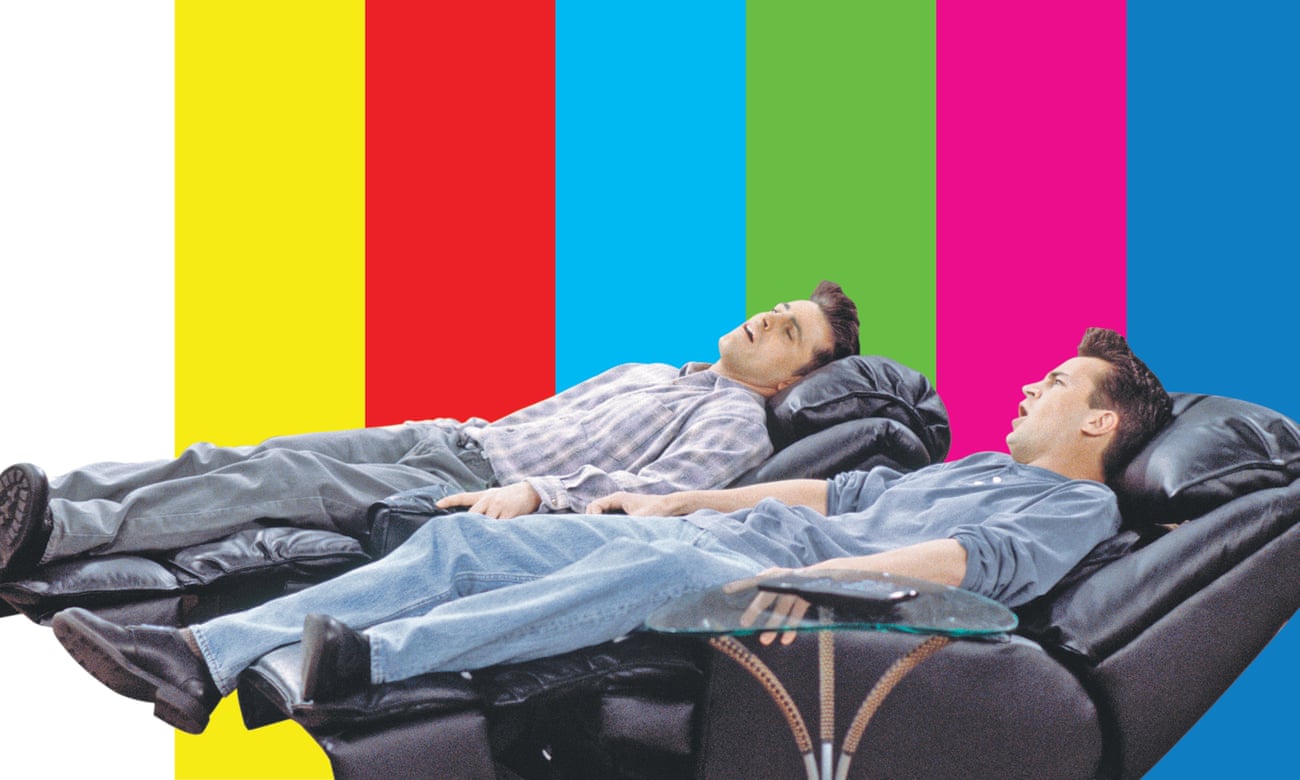WarnerMedia takes $1.2 billion revenue hit in hopes that HBO Max pays off in the long run
:format(webp)/cdn.vox-cdn.com/uploads/chorus_image/image/66211791/1199780229.jpg.0.jpg)
HBO Max is going to cost AT&T a lot of money — but company executives are mostly fine with a short-term loss if the long-term gain pays off. AT&T reports in its quarterly earnings this morning that its WarnerMedia division lost more than $1 billion in revenue due to investment in HBO Max, the streaming service it’s preparing to launch this May. Specifically, those losses are due to “HBO Max investments in the form of foregone WarnerMedia content licensing revenues.” Basically, AT&T is taking a pretty big hit by not licensing a number of its WarnerMedia shows and movies to streaming competitors like Netflix and Hulu.
Upskilling and college education rates in 2040

Coding-based apprenticeships may be a recent development, but Terenzio predicts that in 20 years, more and more companies will adopt similar models. “I can see it in every industry: healthcare, medical billing, other kinds of jobs,” Terenzio says. Many workplace and higher education experts agree. We talked to six professionals whose work involves predicting the nature of education and upskilling in 2040 and what the workforce is likely to demand from employees. They all shared the consensus that change is the only certainty. Workers, employers, and education providers alike need to be agile, flexible, and prepared to adapt as technology continues to disrupt industries and change what jobs will and will not be available.
Source: Fast Company
Netflix to Lay Off Employees as It Shifts Marketing Strategy

Sources say at least 15 people are expected to exit this week as the company moves to better advertise the service rather than its individual shows.
Source: Hollywood Reporter
BoJack Horseman’s finale signals the end of a Netflix era
:format(webp):no_upscale()/cdn.vox-cdn.com/uploads/chorus_asset/file/19652856/BoJack_Horseman_S06E01_12m1s17305f.jpg)
When it premiered in 2014, it was one of Netflix’s earliest, best shows — and it would have failed in 2020. BoJack Horseman, one of Netflix’s longest-running shows, comes to an end this Friday. But it’s unclear if BoJack Horseman would have succeeded if it was ordered today. It’s a show that needed time to breathe, and that’s a luxury most shows don’t get on Netflix anymore. BoJack Horseman feels like the end of an era for Netflix, one that produced long-running series like Orange is the New Black and House of Cards. All three shows were ordered by Netflix between 2013 and 2014, an ambitious time for the company. This was a period when Netflix didn’t have a new series or movie every week. Netflix slowly started rolling out original series to its subscribers, designed to exist alongside and stand out from the plethora of licensed series already on the service.
Source: The Verge
Scroll makes hundreds of websites ad-free for $5 per month
:format(webp)/cdn.vox-cdn.com/uploads/chorus_image/image/66207215/scroll.0.png)
A new subscription service called Scroll is offering ad-free access to hundreds of websites — not by blocking the ads, but by working with an expanding group of publishers to take the ads down in exchange for a slice of the subscription fee. Scroll launches today with support for a number of major websites and networks, including The Atlantic, BuzzFeed News, G/O Media (which includes websites like Gizmodo and Kotaku), and Vox Media, which — important disclosure here — includes The Verge
Source: The Verge
Lessons for Retailers from the Rebirth of Indie Bookstores

Independent bookstores are resurging. Their strategies offer lessons for many disrupted industries to compete against Amazon and other digital retailers, says Ryan Raffaelli.
Source: Harvard Business School Working Knowledge
Trump’s Digital Advantage Is Freaking Out Democratic Strategists

Experts in the explosively growing field of political digital technologies have developed an innovative terminology to describe what they do — a lexicon that is virtually incomprehensible to ordinary voters. This language provides an inkling of the extraordinarily arcane universe politics has entered:
- geofencing,
- mass personalization,
- dark patterns,
- identity resolution technologies,
- dynamic prospecting,
- geotargeting strategies,
- location analytics,
- geo-behavioural segment,
- political data cloud,
- automatic content recognition,
- dynamic creative optimization.
Geofencing and other emerging digital technologies derive from microtargeting marketing initiatives that use consumer and other demographic data to identify the interests of specific voters or very small groups of like-minded individuals to influence their thoughts or actions. Microtargeting first had a significant impact on American politics in state level campaign work by Alec Gage, a Republican, and his firm TargetPoint in 2002.
Source: The New York Times
‘We can’t scale humans’: Why startups are raising millions to build AI avatars
Startups are creating unsettling human-like avatars to take over customer service jobs—or even act as a stand-in for celebrities.
Source: Fast Company
Amazon vs. Walmart: Who’s Really Winning Online Grocery?
Consumer adoption of online grocery—led primarily by Amazon and Walmart—saw hockey-stick growth last year. As these two Goliaths vie for market control, conflicting reports have made it difficult to determine who has the momentum, and where consumers prefer to shop. Amazon currently holds the largest market share of online grocery. We estimate that Amazon’s US food and beverage sales amounted to $6.13 billion in 2019, or 23.7% of total US food and beverage ecommerce sales. However, a September 2019 survey conducted by The Retail Feedback Group found that 37% of US digital shoppers most recently purchased groceries from Walmart, compared with 29% who used Amazon.
Source: eMarketer
The mass Twitch exodus: Why streamers are leaving
:format(webp)/cdn.vox-cdn.com/uploads/chorus_image/image/66172676/kwhitman_200124_0990_final_2040x1360px.0.jpg)
A few years ago, if you were a streamer, you were on Twitch — simple as that. Outside of a few select content creators, everyone who wanted to be a streamer had to use Twitch’s platform. It was the only viable game in town. But over the last year, the streaming landscape has changed. Twitch still remains the largest streaming platform, but some of its biggest creators are signing exclusive contracts with platforms like Mixer, Caffeine, YouTube, and Facebook Gaming. Which leaves fans with a question: Why? The answer is a lot more complicated than you might think.
Source: Polygon
How we survive the surveillance apocalypse

Online privacy is not dead, but you have to be angry enough to demand it.
Source: The Washington Post
Technique Spotlight: Bad Guy’s Prosody
The Eilish siblings’ writing and production style is certainly unlike anything we’ve heard in recent mainstream hits, and Bad Guy is no exception. The song uses a variety of interesting vocal production techniques, including a stuttered vocal transformer effect and relatively dry, intimate vocals (as opposed to the more prominent reverb heard in most Pop songs), as well as pitch-shifted laughter and distorted breath sound effects. The song also contains several interesting compositional characteristics such as a highly differentiated bridge that turns the song on its head from danceable Indie Electropop to aggressive Trap, and multiple turnarounds that provide engaging contrast over the course of the song. However, despite its highly unique elements, other elements such as Bad Guy’s K.I.S.S. ME melody (Keep It Simple, Singable & Memorable), effective rhyme schemes, and an infectious combination of instrumental and vocal hooks give it the mainstream appeal it needed to easily connect and resonate with widespread audiences.
Source: Hit Songs Deconstucted
Atari is making Atari hotels now
:format(webp)/cdn.vox-cdn.com/uploads/chorus_image/image/66174718/atari_01.0.jpg)
Atari’s hotels will, of course, be video game themed, featuring “fully immersive” virtual reality and augmented reality experiences, and venues at select locations designed to accommodate esports events. As seen in renders of the hotels, the iconic Atari logo will feature prominently in the design of the company’s buildings.
Source: Polygon
What Last Year’s Legal Decisions Mean For Music In 2020
![]()
It’s been an interesting year in the music legal field. Some outcomes were positive steps forward for the music industry, and some, well, not so much. Here’s a recap of some of the most talked-about legal happenings of 2019, and what they could mean for 2020.
Sourcce: Hyperbot
Hype House and the Los Angeles TikTok Mansion Gold Rush

The city is home to a land rush of “collab houses,” where the content creators are getting younger and younger.
Source: The New York Times
‘The Witcher’ Is Netflix’s Most Important Show and a Bullish Sign for the Stock
The show, which one might call a poor man’s Game of Thrones, made its debut on Dec. 20 and has become a cultural phenomenon. It’s based on a Polish fantasy novel series written by Andrzej Sapkowski. First published in 1993, the book created a world of dragons, monster killers, and sorceresses. Decades later, we can’t get enough. Some 76 million households watched the show in its first four weeks, Netflix (ticker: NFLX) said this past week. CEO Reed Hastings called it a “massive new franchise that will develop season after season.” For a sense of just how big The Witcher has become, the latest season of The Crown, one of Netflix’s most expensive shows, had 21 million household views in its first four weeks.
Largely thanks to The Witcher, Netflix beat overall expectations in the fourth quarter, with 8.3 million net new subscribers internationally and 420,000 in the U.S. Wall Street expected 7.2 million international adds and 618,000 domestic adds.
But it wasn’t a perfect quarter, and Netflix shares actually fell on the earnings news. Netflix said that its recent price increases and launches by competitors—Apple TV+ and Disney+ both started in November—had a negative effect on domestic subscriber growth. Netflix blamed churn, or customer turnover, for a lower-than-expected subscriber forecast for the first quarter.
Moreover, Netflix is making a big change to how it measures viewership. Going forward, it will count a household view after two minutes of watch time versus the prior method, which required viewers to complete 70% of a show or movie. Netflix said the new methodology boosts metrics by 35% on average. Messing with metrics is often a red flag about future trends.
Source: Barron’s
Google’s ads just look like search results now
:format(webp)/cdn.vox-cdn.com/uploads/chorus_image/image/66152488/image__13_.0.png)
Last week, Google began rolling out a new look for its search results on desktop, which blurs the line between organic search results and the ads that sit above them. In what appears to be something of a purposeful dark pattern, the only thing differentiating ads and search results is a small black-and-white “Ad” icon next to the former. It’s been formatted to resemble the new favicons that now appear next to the search results you care about. Early data collected by Digiday suggests that the changes may already be causing people to click on more ads.
Source: The Verge
6 Big Tech antitrust issues about Amazon, Apple, Google, and Facebook
:format(webp)/cdn.vox-cdn.com/uploads/chorus_image/image/66143657/1164459224.jpg.0.jpg)
As antitrust investigations into Amazon, Apple, Google, and Facebook ramp up, execs from Sonos, PopSockets, and Tile testified before Congress.
Source: Vox
TikTok’s Ad Formats and Partnerships
It’s now been more than a year since TikTok launched in the US, and in that short period, the Chinese-owned video app has capitalized on the viral nature of its platform by partnering with a number of brands and slowly unveiling a slew of advertising capabilities. In the hopes of reaching a younger audience, TikTok announced a multiyear partnership in early September with the National Football League (NFL). Tom Brady, the six-time Super Bowl-winning quarterback of the New England Patriots, posted for the first time on his TikTok account, sharing highlights from his first week of the season. Brady and the NFL join a host of other US brands that are hoping to reach younger consumers through TikTok. Below is a roundup of TikTok’s current ad offerings and some of its biggest brand partnerships to date.
Source: eMarketer
Audiobooks or Reading? To Our Brains, It Doesn’t Matter

If you don’t have time to sit and read a physical book, is listening to the audio version considered cheating? To some hardcore book nerds, it could be. But new evidence suggests that, to our brains, reading and hearing a story might not be so different.
Source: Discover Magazine
Roku’s smart soundbar enters a crowded audio field

Back in January 2018, Roku announced a grand vision for parlaying its streaming TV success into a broader home entertainment platform. The plan was to power not just smart TVs and streaming boxes, but speakers and soundbars with whole-home audio, all of which would be orchestrated by a voice assistant.
Little of that plan has come to fruition since. The company released a set of wireless TV speakers last fall, but they were only compatible with smart TVs running Roku’s operating system, limiting their appeal. Meanwhile, TCL abandoned plans for a Roku-powered soundbar last year, and Roku seems to have scaled back its voice control ambitions.
Now, Roku is taking a second shot at home audio with the Roku Smart Soundbar. Unlike a typical soundbar, this one also doubles as a Roku streaming video player, so you don’t have to use it with a Roku smart TV or even a separate streaming box. It’ll ship in mid-October for $180, and Roku will sell a subwoofer to pair with it for another $180. Unlike last year’s Roku wireless speakers, available only through Roku’s website, the soundbar will be on sale in Best Buy stores.
Source: Fast Company
Google Is Fined $170 Million for Violating Children’s Privacy on YouTube

Google on Wednesday agreed to pay a record $170 million fine and to make changes to protect children’s privacy on YouTube, as regulators said the video site had knowingly and illegally harvested personal information from children and used it to profit by targeting them with ads. Critics denounced the agreement, dismissing the fine paltry and the required changes as inadequate for protecting children’s privacy.
Source: The New York Times
Now Facebook says it may remove Like counts

Facebook could soon start hiding the Like counter on News Feed posts to protect users’ from envy and dissuade them from self-censorship. Instagram is already testing this in 7 countries including Canada and Brazil, showing a post’s audience just a few names of mutual friends who’ve Liked it instead of the total number. The idea is to prevent users from destructively comparing themselves to others and possibly feeling inadequate if their posts don’t get as many Likes. It could also stop users from deleting posts they think aren’t getting enough Likes or not sharing in the first place.
Source: TechCrunch
New Australian video series made for mobile
Presented in a portrait ratio that takes up the entirety of the viewer’s smartphone, Content has been billed as “Australia’s first ever vertical video series”. It belongs to a small genre of narrative productions told entirely through screens, such as the feature film thrillers Searching and Unfriended, which unfold via laptop and smartphones.
Source: The Guardian
Inside Amazon’s long game to put Alexa in your car

The demo house Amazon built inside one of the towers at its Seattle headquarters to show off its Echo smart speakers has a new room, and an important one: a garage. Inside the garage is a concept electric car—or, more specifically, the immobile insides of such a vehicle—that Amazon uses to show automakers the full spectrum of things its Alexa Auto software platform can do. That includes in-car versions of typical Alexa tasks such as audio streaming, messaging, voice calls, and reminders. And because it’s a car, Alexa can also do things like roll the windows up and down and control the cabin temperature, all at the verbal request of the driver. Amazon has been working hard on Alexa Auto for the past two years. Now it hopes to convince automakers to embed the platform into their new cars.
Source: Fast Company
Snap Deepens AR Push With Lens Studio Update, Including New Templates And Landmarkers
If there was any doubt before, Q3 2019 has made clear that Snap is betting heavily on Augmented Reality (AR). Earlier this month, Snap announced a $1B fundraise to invest in AR startups. A week later, the Snapchat parent company unveiled the third-generation of Spectacles, its AR sunglasses, which are now available for pre-order. Snap is continuing its emphasis on the AR ecosystem in an announcement today: a major update to Lens Studio, the company’s desktop app for producing augmented reality “Lenses” on the Snapchat messaging platform. The update includes 14 new Landmarker locations, six new templates, and an updated UX that highlights new offerings and provides step-by-step tutorialization for beginners.
Source: Forbes
Lambda School’s For-Profit Plan to Solve Student Debt

Lambda School is an online coding program that’s free until you finish and get a job. The central conceit is an income-share agreement (ISA): students pay nothing while attending the school and then pay a portion of their earnings once they’re employed. The concept, first proposed by economist Milton Friedman in the 1950s as a “human capital contract,” has been heralded by some as a market-based solution to student debt. Everyone is on the same page about the goal: finding a good-paying job.
Source: Wired
The Definitive Tactical Guide to Quitting Facebook

For all its flaws, Facebook is still be an integral part of many people’s lives, acting as a lifeline to faraway relatives, a trove of professional opportunities, a connection to the neighborhood, or a digital map of experiences lived. Plus, with all the ancillary apps that require (or provide the convenience of) Facebook logins, like Spotify, Tinder, and Airbnb, quitting can feel like fighting your way out of an impossibly tangled web. If you truly want to leave the platform without a trace, you’ll need to put in some effort. Here’s how to do it.
Source: OneZero
Fortnite Maker Wants to Sell More Games and Build a Platform to Do It

Epic Games wants to change the way people buy video games, but it faces the dominance of Steam, the primary destination for online game purchases.
Source: The New York Times
WeWork: Is There Any There There?

For a hipster office-rental company with a chillax mood and kombucha on tap, the vibe around WeWork these days has gotten pretty gnarly. Is the I.P.O. filing by the We Company, the parent of WeWork, a “masterpiece of obfuscation,” as one savvy Wall Street analyst said this week, a thumbs-down sentiment that is shared by many others?
Source: The New York Times
How Internet Slang Makes People Better Writers

In her new book, Because Internet: Understanding the New Rules of Language, Gretchen McCulloch challenges the idea that the rise of informal writing signals a trend toward global idiocy. Instead, she marks it as an inevitable and necessary “disruption” in the way human beings communicate. “We no longer accept that writing must be lifeless, that it can only convey our tone of voice roughly and imprecisely, or that nuanced writing is the exclusive domain of professionals,” McCulloch argues. “We’re creating new rules for typographical tone of voice. Not the kind of rules that are imposed from on high, but the kind of rules that emerge from the collective practice of a couple billion social monkeys — rules that enliven our social interactions.”
Souorce: The Atlantic
How the intern economy is shaping the future of work

It’s the eternal Catch-22 of the working world: You can’t get a job without experience, but you can’t get experience without a job. While babysitting, waiting tables, and other part-time jobs have long been the purview of teens looking to pocket some money while waiting to land a “real job,” the skills gained in such positions don’t always equip you for an entry-level gig in a specific profession. This is where internships come in.
Souorce: Fast Company
The age of comfort TV: why people are secretly watching Friends and The Office on a loop

It seems that, in this time of unprecedented choice and quality, the so-called golden age of prestige television, most of us still want to watch half-hour shows about vaguely likable people in which everything turns out OK. Ideally from the 90s, but maybe the 00s. And preferably something that we have seen many, many times before. Welcome to the age of non-event TV.
Source: The Guardian
In New Facebook Effort, Humans Will Help Curate Your News Stories

The Silicon Valley company said that journalists would help curate News Tab, a new section inside of the company’s mobile application that will surface the most recent and relevant stories for readers. Facebook said it planned to hire seasoned journalists from various outlets for the roles and would put up job postings on its employment board on Tuesday. News Tab is part of the company’s effort to highlight real-time journalism and news. It will exist outside of the News Feed, Facebook’s never-ending stream of status updates and friend requests.
Source: The New York Times
Hulu Documentary ‘Jawline’ Casts a Sharp, Sympathetic Eye on Gen Z’s Pretty-Boy Influencer Culture
If words like YouNow, Tanacon, Mikey Barone, or Musical.ly do not ring a bell, Hulu’s latest documentary offering, Jawline, will likely make you feel very, very old. But it will also make you glad you are no longer in high school. The film tracks the distinct breed of teen boy influencer who gains fame, particularly amongst the tween girl set, through livestreaming and niche platforms like Musical.ly (now called TikTok). In this post-YouTube era, these influencers need not have any marketable skills or preternatural talent to become stars. But they do all seem to fit a similar physical mold—pretty faces, toned but lithe physiques, gravity-defying coifs, and, as the title of the doc suggests, a chiseled jawline. And they all trade, like Beatlemania, in hysterical teenage girl lust.
Source: Daily Beast
Something You Don’t Want to Hear About Earbuds

Hearing loss isn’t just the stuff of senior citizens: 1 in 5 teens will experience hearing loss — a rate that’s 30% higher than it was 20 years ago. You know what wasn’t around 20 years ago? Earbuds. At maximum volume, earbuds and AirPods can be as loud as 110 decibels, which is the equivalent of someone shouting directly into your ear. According to the CDC, being exposed to 85 decibels over a prolonged period, or repeatedly, puts you at risk of hearing damage. If you’re listening to your earbuds at the maximum volume of 110 decibels, you’re at risk of hearing loss after just five minutes — barely the length of two songs.
Source: Medium
Depop Is Gen Z’s Favorite Shopping App
![]()
Depop is a sales platform for the secondhand, an impossibly enormous international flea market in app form. If eBay is a bazaar and Instagram is a beauty pageant, Depop is both. Just about anything you can shoot with your iPhone camera you can sell on Depop, so there’s Polaroid film and skateboards and a 1978 Garfield alarm clock and God knows what else, but mostly there are secondhand clothes and accessories, a digital thrift haul exploding out of its users’ literal closets.
Source: The Cut
When students get stuck, Socratic can help

In building educational resources for teachers and students, we’ve [Google] spent a lot of time talking to them about challenges they face and how we can help. We’ve heard that students often get “stuck” while studying. When they have questions in the classroom, a teacher can quickly clarify—but it’s frustrating for students who spend hours trying to find answers while studying on their own. Socratic, a mobile learning app we acquired last year, now uses AI technology to help high school and university students when they’re doing school work outside the classroom. It guides them through the resources that are available, and identifies the core underlying concepts that will lead them to answers to their questions.
Source: Google
A.I. Is Learning From Humans. Many Humans.

A.I., most people in the tech industry would tell you, is the future of their industry, and it is improving fast thanks to something called machine learning. But tech executives rarely discuss the labor-intensive process that goes into its creation. A.I. is learning from humans. Lots and lots of humans.
Source: The New York Times
Snap’s redesigned Spectacles are here—and it doesn’t care if you buy them
Snap is thinking of the new Spectacles as a test run in the company’s push to bring augmented reality to the masses—a trajectory the company began with its popular face filters. By putting another camera on Spectacles 3, Snap opens up a new realm of AR effects that users can add to their videos and images. It’s not just phoenixes; users can also add colorful filters that morph throughout a video based on how far away objects are in the shot and animated hearts that float around a video but burst when they come into contact with a real-world object. Snap is also opening up the depth map’s features to content creators, enabling to make their own AR filters through its DIY filter maker, Lens Studio.
Source: Fast Company
